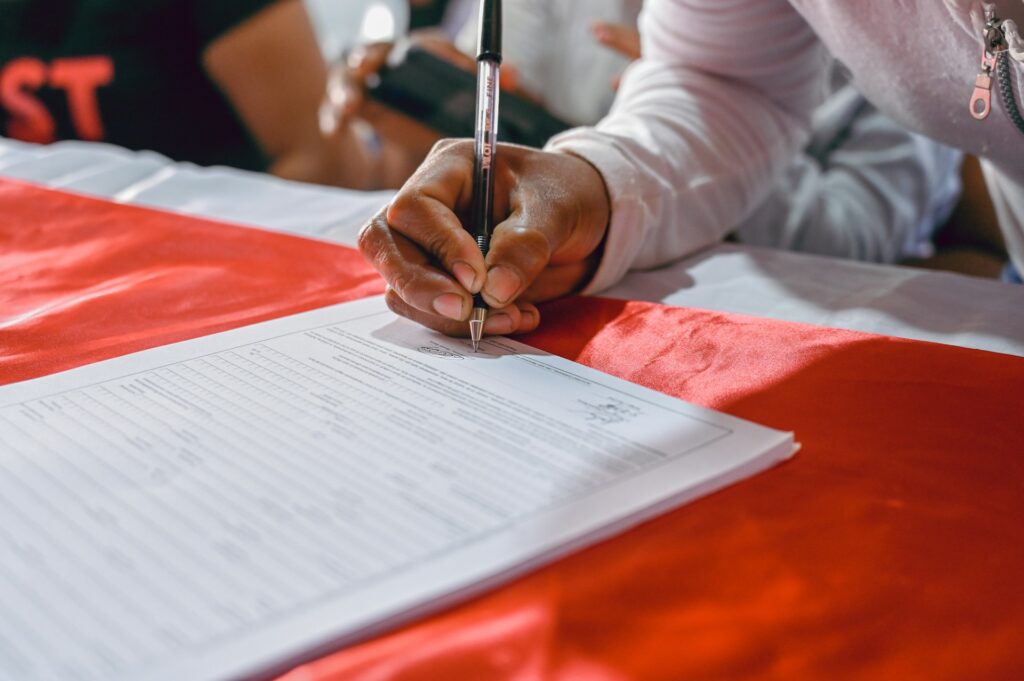Are notary services free, as many people tend to wonder? Well, the answer comes to you naturally – but we decided to write this article anyway.
You see, notaries play a vital role in our society. They act as impartial witnesses when you sign important documents, such as wills, trusts, deeds, and powers of attorney. Their presence helps prevent fraud and makes sure your documents are legally valid, giving you peace of mind knowing your affairs are in order.
You will find the answer to this question right here. We’ll also tackle other relevant questions, like “Where could I find free notarization services?”, “How does notarization work?”, and introduce mobile notarization, an extremely convenient alternative for your hassles.
Are notary services free?
The straightforward answer? Not usually. While it’s not impossible to find free notary services, they are not common either.

Understanding why notary services typically come with a fee requires a closer look at the role of a notary public and the value they provide. Notaries are commissioned officials who act as impartial witnesses to the signing of important documents.
Their job is to deter fraud and ensure the authenticity of signatures by verifying identities, witnessing signatures, and maintaining detailed records of every notarization they perform.
Each state in the U.S. sets maximum fees that notaries can charge for their services, ensuring reasonable costs. While this means you likely won’t encounter exorbitant fees, it also means that most notaries charge for their services, reflecting the time, expertise, and legal responsibility they shoulder.
Where you might find free notarization services (and their potential caveats)
Banks and credit unions are frequently cited as the best places to get free notarization services.

Why? Well, they frequently handle documents that require notarization, such as loan agreements, mortgage documents, and other financial instruments. As a courtesy to their customers, many banks and credit unions employ notaries public on staff, letting customers have their documents notarized without leaving the bank.
However, keep in mind that these institutions may not be equipped to notarize every type of document. Their services might be limited to customer transactions and specific document types. Additionally, they may only offer services to existing customers and could charge a fee to non-customers.
If in doubt, check your bank’s or the local credit union’s website or get in touch with them to learn more about the notarization services they may offer.
Public libraries and courthouses are also a great option in a pinch. As a public service, they may offer free or low-cost notarization services to their community. This can be a valuable resource for individuals who require basic notarizations and may not have access to banking services.
However, these services are often subject to limited availability, might only be offered during specific hours, and often have long wait times due to high demand. It’s essential to call ahead and check on the availability of a notary and any potential additional requirements or restrictions.
How does the notarization process work?

Now that we’ve addressed the question of cost, let’s shed some light on what happens during a notarization. The process is generally straightforward and designed to be efficient while maintaining a high standard of security.
When you meet with a notary public, the first step is to provide a valid, government-issued photo ID, such as a driver’s license or passport. The notary will carefully examine your document, verifying its authenticity and ensuring it’s current and hasn’t been tampered with. This crucial step helps prevent identity theft and ensures that you are who you claim to be.
Once your identity is confirmed, you’ll sign the document in the notary’s presence. The notary acts as an impartial witness, observing the signing and ensuring it’s done freely and without coercion. They are there to protect the integrity of the process and ensure that no one is being forced into signing something they don’t agree with.
For some documents, such as affidavits or depositions, you may also be required to take an oath or affirmation, solemnly swearing to the truthfulness of the document’s contents.
Finally, the notary will affix their official seal and signature to the document, formally acknowledging their role in the process and validating the notarization. This final step provides legal recognition and adds a layer of security to the document.
This seemingly simple act of notarization carries significant weight in legal contexts. It transforms a privately signed document into a legally binding one, assuring all parties involved. Notarization deters fraud, safeguards against forgery, and provides extra protection for everyone involved.
What is mobile notarization?

While banks, credit unions, and some public institutions offer notary services, many people find these options inconvenient or inflexible. Traditional notary services often involve strict operating hours, long wait times, and the need to travel to a specific physical location – a major disruption for busy individuals and families.
Fortunately, there’s a modern and increasingly popular alternative: mobile notarization. As the name suggests, mobile notaries travel directly to their clients, bringing their notary services to homes, workplaces, or coffee shops – wherever is most convenient for you.
This eliminates the usual stress of fitting your schedule around a notary’s availability, allowing you to choose a time and location that works best for you.
Main benefits of mobile notarization
For one, they minimize disruptions. Whether you’re a busy professional, a parent with young children, or simply value your time, mobile notarization helps you avoid the hassles of traditional options. No need to take time off work, find last-minute childcare, or navigate traffic during peak hours;
They also let you accommodate urgent needs. Mobile notaries often offer extended hours, including evenings and weekends. This flexibility ensures you can access notary services when you need them most, accommodating tight deadlines or time-sensitive documents;
Finally, you can enjoy enhanced security and privacy. For documents containing sensitive information, mobile notarization offers an added layer of security and privacy. Meeting in the comfort of your home or office allows for a more discreet and confidential signing experience.
Are mobile notaries legitimate?
You might wonder if using a mobile notary is as legitimate as visiting a traditional notary public. Well, absolutely!
Mobile notaries are fully licensed and commissioned by the state, just like their counterparts in fixed locations. They possess the same legal authority to perform notarizations and are held to the same high standards of professionalism and ethical conduct, including punishments should they make mistakes.

Rest assured that mobile notaries undergo the same rigorous background checks, training, and certification processes as any other notary public. For a more in-depth look at the legitimacy and legal standing of mobile notaries, we encourage you to read our comprehensive article on this very topic.
Conclusion
Finding free notary services isn’t impossible, but it can require extra legwork and may come with some limitations. Fortunately, convenient and reliable notary services are easily accessible, even if they typically involve a fee.
When you factor in the value of a notary’s expertise, the peace of mind they provide, and the legal protection they offer, the cost of notarization is a small price to pay to ensure your important documents are legally sound.
At Mobile Notary Orlando, we understand that life doesn’t always go on a 9-to-5 schedule. That’s why we’re available 24/7, providing prompt and professional mobile notary services throughout Orange, Seminole, Osceola, and Brevard Counties.
Whether you need a simple affidavit notarized or require assistance with complex real estate documents, we are here to help. We’re available by phone or text, so feel free to reach out however is more comfortable!






